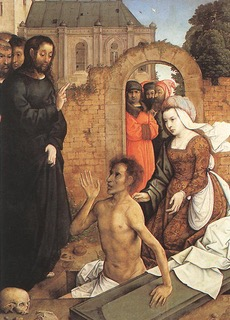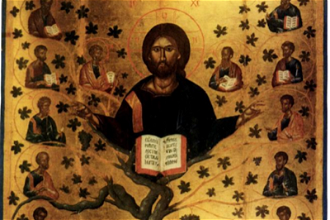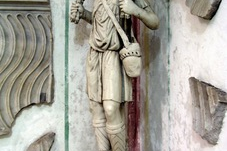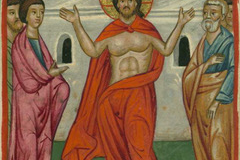Sunday Reflection with Canon Robin Gibbons - 17 March 2024

The Raising of Lazarus, by Juan de Flandes.
Fifth Sunday in Lent
1. The conundrum of Lazarus
Who can remain unmoved by the story of Lazarus being called out from death by Jesus, it is both enormously compassionate yet also horrific, the decayed body is called to life, almost like a Frankenstein figure, monstrous in its decay, and many artists have portrayed the horror of that moment in their depictions of this gospel story, for many it is a conundrum, a puzzle to wrestle with. This phrase uttered by Martha to Jesus in the gospel, tells of the disturbed and raw atmosphere of bereavement:
'So Jesus, perturbed again, came to the tomb. It was a cave, and a stone lay across it. Jesus said, "Take away the stone." Martha, the dead man's sister, said to him, "Lord, by now there will be a stench; he has been dead for four days."'(Jn 11:38, 39). It is not a pretty picture, so we may well ask why Jesus responded in this way, especially as we know that far from Lazarus being called into eternal life at this point, the poor man will live but is destined again for death? What does this mean and what happened to Lazarus when he came out of the tomb?
2. Our own ending is in Lazarus.
I have no great answers, nor do I have any great explanations. Why? Because I suspect that what this really means for each of us is a connection to our own death, to our own destiny, and that is deeply personal as well as communal. That Jesus calls Lazarus back from death has the atmosphere of a deep miracle, but in the light of the resurrection of the Lord Jesus himself from the dead, what might it mean.
In one sense it is definitely a call of compassion, the everlasting love of Christ for friends and loved ones, the response of the merciful God towards us all, yet in another sense it calls into question a number of issues . Why raise from the dead those who have died? What purpose does it serve? The key is of course in John's statement about Jesus:
'When Jesus heard this he said, "This illness is not to end in death,* but is for the glory of God, that the Son of God may be glorified through it"'.(Jn 11.4) This is about the Christ , true human, true God, who is above all human concerns as the true God made one of us and who, in the events we will celebrate shortly, reveal His glory and triumph over suffering and death in the resurrection.
3. The situation explored
That makes sense, for it opens a way for us to see the account of Lazarus as part of the unfolding recognition of Jesus as the chosen one, the Messiah, the Son of God. I can accept that easily, but there is also something troubling about the Lazarus story. Why this delay, why wait until Lazarus has been in the tomb for several days? Perhaps the explanation is in the connection as many have suggested, in something connected to `Jesus' own resurrection. The indication with him is that for to really rise from the dead Jesus has to be in the tomb for three days, completely and utterly dead, in order that that his resurrection be understood by us all as a victory over death. For Lazarus the miracle is bitter sweet, and the fact the had been in the tomb for four days underlines a common Jewish belief of the time, that for three days the soul returns to the body seeking to return, but once facial disfigurement shows decay it leaves never to return again. That is one way some commentators have understood the delay by Jesus, he is well aware of the Jewish understanding of death and time after death.
4. Lazarus is the witness to our change of heart and life
In this way the miracle of Lazarus will be all the more clearer to those who watch and wait to see what he will do, but it is not a resurrection into eternal life, Lazarus has to die, as all must, but until that time he is a stumbling block to those who wish to denigrate and downplay Jesus as Messiah and Lord! Tradition has it that he was hated by those who wanted to keep the story of this miracle, and the name of his deliverer, Jesus the Christ, out of public religion and life, and that in the end Lazarus was martyred, there is an Orthodox tradition that says he never laughed again. But history is unclear and maybe that is a good thing, Lazarus is not the key figure in this tale, that is the Christ. Another part of the story is that reference to love and friendship and the tears Jesus sheds for his friend, we extend that by reminding ourselves that we too are loved by Christ, are also his friends, and that the gift of tears, the compassion of the Holy One, is also for us and given to us, that we in changing our life from the way of darkness might also be called out like Lazarus, to witness to others Christ's love and light, even as we live now.
I found the following comment written by J Warner Wallace about the raising of Lazarus, which I think enormously helpful in grounding me in this gospel story. I end my reflection with it , for it tells me, as I hope it might speak to each one of you something of the designs of Jesus ij this matter:' Jesus waited until all hope was lost for those waiting for death's confirmation. Only then did Jesus raise Lazarus, and the result was stunning amongst those Jews who held these primary beliefs about death and the soul. They became believers'. May our belief in the resurrection of Christ from the dead grow stronger, and our compassion for those who struggle with this aspect of faith be enlarged, so that by our gift of tears and friendship, the touch of Christ may enter their lives. Amen
Lectio
Romans 8: 8-11 ( Our second reading)
Brothers and sisters:
Those who are in the flesh cannot please God.
But you are not in the flesh;
on the contrary, you are in the spirit,
if only the Spirit of God dwells in you.
Whoever does not have the Spirit of Christ does not belong to him.
But if Christ is in you,
although the body is dead because of sin,
the spirit is alive because of righteousness.
If the Spirit of the one who raised Jesus from the dead dwells in you,
the one who raised Christ from the dead
will give life to your mortal bodies also,
through his Spirit dwelling in you.
Come out, Lazar. Anonymous 14th c mediaeval poem:
Come out, Lazar!
Come out, Lazaro, what so befall.
Then might not the fiend of hell
Longer make that soule to dwell.
So dreadful was that ilke cry
To that feloun, our enemy.
The kinges trumpet blew a blast;
Come out! it said, be not aghast.
With that voice the fiend gan quake,
As doth the leaf when windes wake.
Come out is now a wonder soun,
It hath o'er come that foul feloun
And all his careful [wretched] company.
For dread thereof they gunne cry;
Yet is come out a wonder song,
For it has broken the prison strong.
Fetters, chains, and bondes mo [besides]
That wroughten wretched soules woe.
That kinges voice so free
It maketh the devil and death to flee.
Say me now thou serpent sly,
Is not 'Come out!' an asper cry?
'Come out' is a word of battle,
For it gan helle soon [at once] t'assail.
Why stoppest thou not, fiend, thine ear?
That this word enter not there?
He that said that word of might,
Shop him felly to the fight. [Advanced valiantly to battle.]
For with that word he won the field
Withouten spear, withouten shield,
And brought them out of prison strong,
That were enholden there with wrong.
Tell now, tyrant, where is thy might?
'Come out!' hath felled it all with fight.
Notes to explain some of the more difficult or obscure vocabulary in this poem:
1 feloun: traitor
2 gan quake: quaked
3 wonder: wonderful
4 careful: wretched
5 gunne cry: cried
6 mo: besides
7 free: noble
8 asper: harsh
9 soon: at once
10 shop him felly to the fight: advanced valiantly to battle.





















